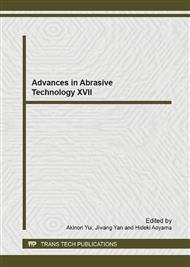p.261
p.267
p.273
p.281
p.287
p.292
p.298
p.304
p.310
Stress Influence on Corrosion Resistance of Aluminum Alloy Surface
Abstract:
C-ring specimen experiment was conducted combined with finite element method, in order to reveal the influence of residual stress on corrosion resistance of machined surface. The results show that pitting is the main corrosion type in marine water under stresses. Under compressive stresses, the distribution and expansion of corrosion pits extend along radial direction of C-ring. The corrosion depth and corrosion area ratio show that corrosion extent decreases with the increase of compressive stress. Finally, the results can be used to optimize cutting parameters.
Info:
Periodical:
Pages:
287-291
DOI:
Citation:
Online since:
September 2014
Authors:
Price:
Сopyright:
© 2014 Trans Tech Publications Ltd. All Rights Reserved
Share:
Citation:


